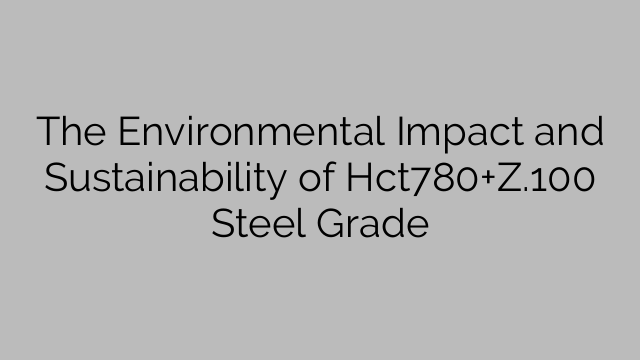The Hct780+Z.100 steel grade is a high-strength, low-alloy transverse steel used in various applications such as automotive, construction, and engineering industries. This steel grade is known for its excellent mechanical properties, including high strength, good formability, and excellent weldability. However, it’s important to consider the environmental impact and sustainability of using Hct780+Z.100 steel grade.
The production of steel, including Hct780+Z.100, has a significant environmental impact. The manufacturing process involves the extraction of raw materials such as iron ore, coal, and limestone, as well as the use of energy and water resources. This can contribute to air and water pollution, deforestation, and the emission of greenhouse gases.
In addition to the environmental impact of production, the use of Hct780+Z.100 steel grade can also have implications for sustainability. The high-strength properties of this steel grade often result in lighter and stronger products, which can contribute to more fuel-efficient vehicles and more sustainable construction projects. Furthermore, the excellent formability and weldability of Hct780+Z.100 steel grade can lead to better resource efficiency and reduced material waste during the manufacturing process.
To address the environmental impact and sustainability of using Hct780+Z.100 steel grade, the industry is taking steps to minimize its footprint. This includes investing in more efficient production processes, utilizing renewable energy sources, and implementing recycling and reuse programs for steel products. Additionally, there is a growing emphasis on designing products with a cradle-to-cradle approach, ensuring that materials can be easily recycled at the end of their lifecycle.
Furthermore, efforts are being made to develop new steelmaking technologies that have lower environmental impact, such as using hydrogen instead of coal in the production process. These advancements could significantly reduce the carbon footprint of producing Hct780+Z.100 steel grade and other steel products.
In conclusion, while the production and use of Hct780+Z.100 steel grade can have a significant environmental impact, the industry is making strides towards greater sustainability. By adopting more efficient production processes and embracing recycling and reuse initiatives, the steel industry is working towards a more sustainable future. Additionally, ongoing research and development of greener steelmaking technologies offer hope for further reducing the environmental impact of high-strength steel grades like Hct780+Z.100. Ultimately, it is crucial for manufacturers and consumers to prioritize sustainability when using Hct780+Z.100 steel grade and other materials, in order to mitigate its environmental impact and support a more sustainable future.

